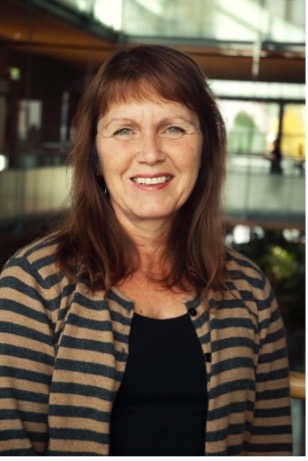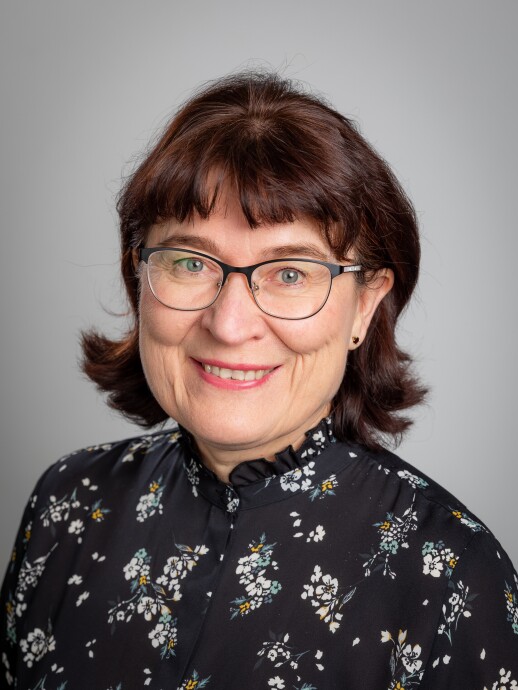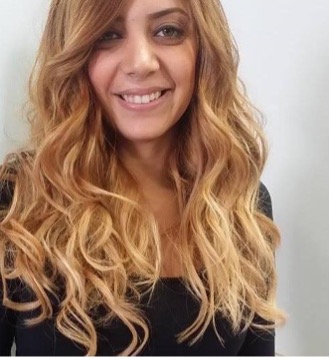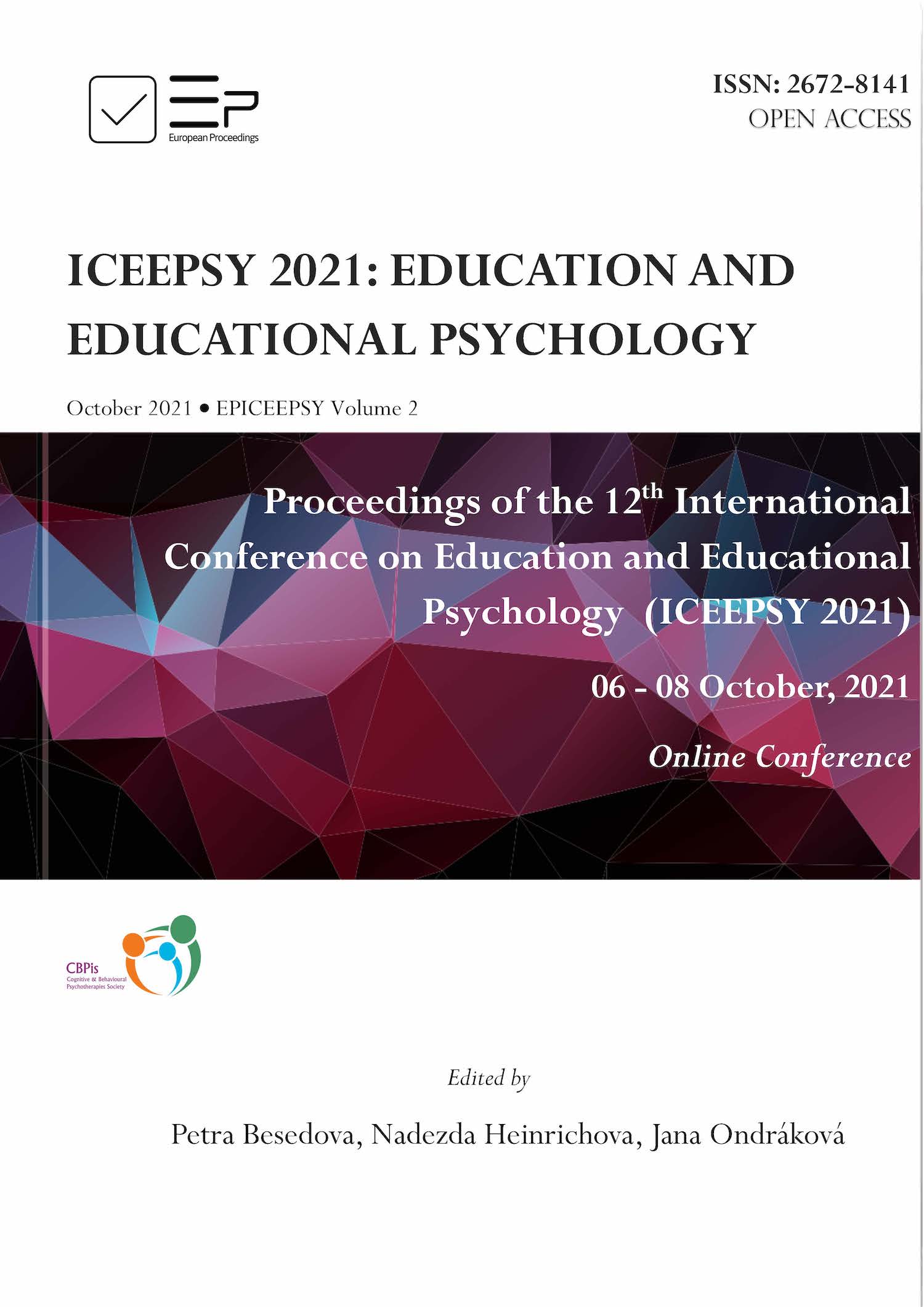ICEEPSY 2021
ICEEPSY 2021
12th International Conference on Education & Educational Psychology, 06-09 October 2021, Remote Conference (via Zoom)
ICEEPSY 2021 Chair's Message |
|
|
Dear Colleagues, To date, more than almost 6.200 participants from more than 91 countries have attended an ICEEPSY conference. The Academics Institute Scientific Committee and Board of Reviewers are already working hard to ensure the continued high-quality of this event. ICEEPSY 2021 will publish all accepted full-text papers in European Proceedings of International Conference on Education and Educational Psychology EpICEEPSY. Previously Published ICEEPSY EpSBS Conference Proceedings Volumes either have been indexed or accepted or submitted in Web of Science Core CollectionTM Conference Proceedings Citation Index - Social Sciences & Humanities (CPCI-SSH) and abstracts will be published in the Abstract Book ICEEPSY (ISSN: 1986-3020), a serial publication registered with the International Centre for the Registration of Serial publications in Paris. Selected papers will be published in the peer reviewed The European Journal of Social and Behavioural Sciences. Papers will focus on the following topics: assessment and evaluation, teacher education, basic education, basic skills, counselling psychology, adolescent growth and development, educational psychology, continuing education, higher education, quality assurance/institutional effectiveness, learning theories, effective teaching practices, second language teaching, new approaches in psychology, special education, education and technology, information and communications technology, and distance learning. We look forward to seeing you online! |
|
|
Inkeri Ruokonen |
|
ICEEPSY 2021 ONLINE PROGRAM AND ABSTRACT BOOK
ICEEPSY 2021 Abstract Book is available from here.
ICEEPSY 2021 took place on Zoom.- Learn more about giving a Live-Stream Presentation via Zoom.
- Learn more about giving a pre-recorded Virtual Presentation.
All presentations will be available online via http://videolectures.net
Sessions will start at 10:00 (GMT), UTC +1 (UK Time).
DAY 1: 6th of October, Wednesday |
|||||
|
Title |
Thematic Section |
Presenter |
|
Video |
|
|
10.00 - 10.15 |
Opening Speech |
|
|
|
|
|
10.15 - 10.45 |
Keynote speech: Exclusion - Integration – Inclusion – What is the difference? |
|
Ann-Katrin Swärd |
|
|
|
10.45 - 11.00 |
Break |
|
|
||
|
11.00 - 11.15 |
Czech Native Speakers Expressing Someone Else´s Opinions in German |
Second Language Teaching |
Jana Ondrakova |
||
|
11.15 - 11.30 |
Cognitive Learning in Relation to Foreign Languages with the Support of Music |
Second Language Teaching |
Petra Besedová |
||
|
11.30 - 11.45 |
English Indirect Questions Taught to Czech Native Speakers |
Second Language Teaching |
Vera Tauchmanova |
||
|
11.45 - 12.00 |
Break |
|
|
||
|
12.00 - 12.15 |
Graphic Novel "Belonging" (2018) by Nora Krug in Flt |
Second Language Teaching |
Nadezda Heinrichova |
||
|
12.15 - 12.30 |
Individual Differences in Early Stage English Learners in Japan |
Second Language Teaching |
Mika Igarashi |
||
|
12.30 - 12.45 |
Break |
||||
|
12.45 - 13.00 |
Risk Behavior of University Students in the Online Environment During the Pandemic |
Education and Technology |
Jana Miková |
||
|
13.00 - 13.15 |
The Use of Digital Technologies in Distance Learning at Primary Schools |
ICT |
Hana Hyksova |
Link |
Link |
|
|
|
|
|
|
|
|
|
|
|
|
|
|
DAY 2: 7th of October, Thursday |
|||||
|
Title |
Category |
Presenter |
|
Video |
|
|
10.00 - 10.15 |
Adolescents With and Without Problems: Ratings About Prosocial Behavior and Empathy Concern |
Adolescent Growth and Development |
Kristi Kõiv |
||
|
10.15 - 10.45 |
Composer Milan Uherek. His Influence on the Repertoire of Children's Choirs |
Performing Arts Education Drama, Theater Dance |
Silvie Langrová |
||
|
10.45 - 11.00 |
Czech University Language Teachers’ Perspectives on the 2020 Pandemic |
Distance Learning |
Hana Pavlisova |
||
|
11.00 - 11.15 |
Break |
|
|
|
|
|
11.15 – 11.45 |
Keynote speech: A Developmental Approach for Infusing Career-Related Issues in An Undergraduate Psychology Curriculum: COVID-19 Impacts on Student Learning |
|
Loretta Simons & Sara Schonemen |
|
Link |
|
11.45– 12.00 |
Break |
|
|
|
|
|
12.00 – 12.15 |
Preschool Education During the Covid-19 Pandemic in the Czech Republic and Sweden |
Teacher Education |
Veronika Gajdová |
||
|
12.15 – 12.30 |
The Research in the Interpretation of Literary Texts at Secondary Schools |
Higher Education |
Alena Zachová |
||
|
12.30 – 12.45 |
Break |
|
|
|
|
|
12.45 – 13.00 |
Transformation of the Supply of Nonformal Education for Adults |
Adult and Continuing Education |
Jan Kalenda |
||
|
13.00– 13.15 |
Validated Interpersonal Confidence Questionnaire to Measure the Impact of Improvisation Training |
Assessment and Evaluation |
Sirke Seppänen |
||
|
13.15– 13.30 |
The Attitude of Kindergarten Specialists and Parents Towards Inclusive Education in Preschools in Russia |
Inclusive Education |
Alexandra Alekseeva |
||
|
|
|
|
|
|
|
DAY 3: 8th of October, Friday |
|||||
|
Title |
Category |
Presenter |
|
Video |
|
|
10.15 - 10.45 |
Keynote speech: Adapting to the Ubiquitous Learning During the Pandemic |
|
Fezile Ozdamli |
|
|
|
10.45 - 11.00 |
Break |
|
|
|
|
|
11.00 - 11.15 |
Coherence Between Verbal, Mathematic, Nonverbal and Motor Skills of Children |
Basic Education – basic skills |
Zdeněk Rechtik |
Link |
|
|
11.15 - 11.30 |
Literary Lessons at Czech Higher Secondary Schools in Gender Perspective |
Adolescent Growth and Development |
Michala Mikolášíková |
||
|
11.30 - 11.45 |
An Italian Pilot Study On Epigenetic Factors In Early Children’s Eating Disorders |
Assessment and Evaluation |
Michela Erriu |
||
|
11.45 - 12.00 |
Break |
|
|
|
|
|
12.00 - 12.15 |
Socio-Demographic and Cultural Determinants of Student Youth Morality |
Educational Psychology |
Svetlana Merzlyakova |
||
|
12.15 - 12.30 |
Suicidal Behavior at School from the Perspective of Teachers |
Educational Psychology |
Marie Herynková |
Link |
|
|
12.30 - 12.45 |
Break |
|
|
|
|
|
12.45 - 13.00 |
Stress Conceptualizing in Students of Different Cultures |
New approaches in Psychology |
Elena Volkova |
||
|
13.00 - 13.15 |
Victories Over Losses During Cancer Treatment |
Guidance and Counselling Psychology |
Monika Ulrichova |
||
|
13.15 - 13.30 |
Closing Speech |
|
|
|
|
|
|
|
|
|
|
|
2021 KEYNOTE SPEAKERS |
|
 |
A Developmental Approach for Infusing Career-Related Issues in An Undergraduate Psychology Curriculum: COVID-19 Impacts on Student Learning Lori Simons & Sara Schoneman |
| Educators propose that career issues should be embedded in psychology courses throughout the curricula, specifically addressed in professional development seminars, and explored in capstone courses as best practices for assisting undergraduate students transition to the workforce (Halonen & Dunn, 2018). The practicum/internship program is a developmental-sequential model that exposes students to career issues in beginning, middle, and ending psychology courses. A total of 306 students participated in a practicum/internship (P/I) program. Of these students, 37 of them were immersed in fieldwork during the outbreak of the pandemic. COVID-19 created new learning opportunities. Students shifted from in-person to telehealth and other online activities at their placement sites. An explanatory mixed-methods research design was used to detect student learning outcomes from the beginning to the end of the P/I program. This cohort of students did not make improvements in student learning outcomes, but they did acquire confidence and other types of soft skills by the end of the program. In contrast, student learning outcomes were detected for the aggregate sample of students. Students made improvements in their racial-cultural identity development, racial, cultural, and social justice attitudes, and problem-solving, civic responsibility, and community engagement skills from the beginning to the end of the program. Retention and employment outcomes further suggest that students remain at the university after being exposed to career issues in beginning and obtain gainful employment in ending psychology courses. Implications for infusing career issues in beginning, middle, and ending courses in an undergraduate psychology curriculum are discussed. | |
 |
Exclusion - Integration – Inclusion – What is the difference? Ann-Katrin Swärd, Ph.D. in Special Education, Ass. Prof. University of Gothenburg, Sweden |
|
Often, we talk about exclusion, integration, and inclusion in relation to preschool and school. These concepts can also be seen in relation to society, from childhood to adulthood. What is the definition of these concepts and how are they used? Giving birth to a child is naturally connected to having one healthy child with typical development. Sometimes life takes another way and the child is born with some sort of disability. Sometimes the child seems to have a typical development but after some year the parent or teacher in preschool/school discover that the child has some difficulties and develops in another way. No matter when the child´s difficulties will be discovered there are of course different reactions in relation to parents' understanding, background, and feelings. But also, to other people’s reactions, like siblings, grandparents, friends, and colleagues. Their reaction can be like sympathy, they feel sad for you. Or it can be more of empathy, try to understand and being more engaged in the situation for the parents. This can be the same with teachers in preschool or school. The more they have of empathy the more engaged and interesting they might be. Only showing sympathy, feeling sad for the child can be obstacle for development and learning but also help the child to feel what we called “learned helplessness”. Every child needs to feel that you believe in his or her possibility to learn and develop. In this presentation, I will try to define exclusion, integration and, inclusion from different perspectives and also in different context. |
|



